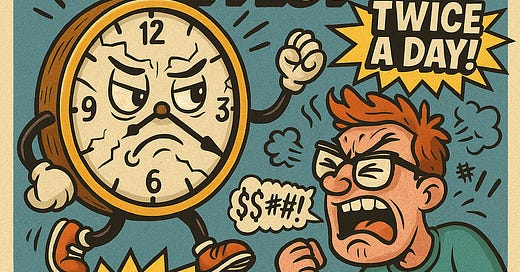This post is 578 words, about a minute read. Enjoy!
We’ve all heard the saying, “A dead clock is right twice a day.” It’s usually shared as a reminder to stay open-minded—that even bad sources can occasionally offer good ideas.
Let’s flip that idea on its head. Because what no one talks about is what happens when you start relying on that dead clock to tell time.
That’s what I call The Dead Clock Effect: taking something that’s only occasionally right, and acting like it works all the time.
Sure, a dead clock is correct twice a day—for two brief 60-second intervals, it’s perfectly accurate. But for the other 23 hours and 58 minutes, it’s completely useless. And that’s where most of life happens.
The problem is, we’ve started applying “dead clock thinking” to every part of our lives. We trust broken tools, outdated ideas, and overhyped products as if they were universal solutions. And when you do that, chaos isn’t a possibility—it’s a guarantee.
💰 Exhibit A: Whole Life Insurance
Whole life insurance is a niche financial product. It was designed for a very specific purpose and audience. What purpose, exactly? These days, it’s hard to say—because it’s being marketed as a financial Swiss Army knife.
Need life insurance? Whole life.
Want to save for retirement? Whole life.
Looking for tax advantages? Whole life.
Need a loan? Whole life. (Infinite Banking, baby.)
A product designed for one thing is suddenly being sold as the answer to everything. And that’s the Dead Clock Effect in action.
📉 It Doesn’t Stop There
We see the same thinking all over the place:
Investors chasing downside protection during every market dip—never mind that it was meant for rare events.
Options trading becoming mainstream, when it was built for highly specific strategies.
Crypto pitched as the cure for everything from inflation to financial sovereignty.
We grab specialized tools and try to use them for everything. But just because something worked once doesn’t mean it will work again—or everywhere.
🧠 This Applies to People, Too
Dead Clock thinking isn’t just about products. It’s about people. Some sound brilliant because they take an idea that worked in one situation and apply it everywhere, whether it fits or not.
We see it in politics constantly. Promises without details. Vague ideals sprinkled with just enough truth to seem credible. Context stripped away, complexity ignored.
It’s Elon Musk trying to bulldoze government institutions as if they were bug-ridden apps—forgetting that real lives and public infrastructure aren’t run on code.
It’s Trump treating tariffs like a universal remote—for fixing trade, diplomacy, deficits—ignoring global retaliation.
It’s young men falling for Andrew Tate. Sure, he says a few good things about responsibility and masculinity. But those are wrapped in toxic views that do real harm.
The Dead Clock Effect shows up everywhere, once you start paying attention.
In fact, it’s even in this post. I’m making a broad claim, applying it across multiple areas. But that’s kind of the point: when you don’t question the source, when you don’t check the time, you end up running your life with a broken clock.
Are there moments when these people or products are right? Absolutely.
But is it what you actually need? Probably not.
So the next time someone offers you a one-size-fits-all solution, ask yourself: Is this a moment of truth, or am I listening to a dead clock?
Remember Generosity>greed!
God Bless You!
✌🏾
Recommendation Section
Morgan Housel in "How I Think About Debt", talks about the true cost of having debt. One of my favorite quotes on debt came from reading this post
“Debt defines your future, and when your future is defined, hope begins to die.”
If you prefer to listen, here is a link to the audio version on Spotify and Apple Podcast.



